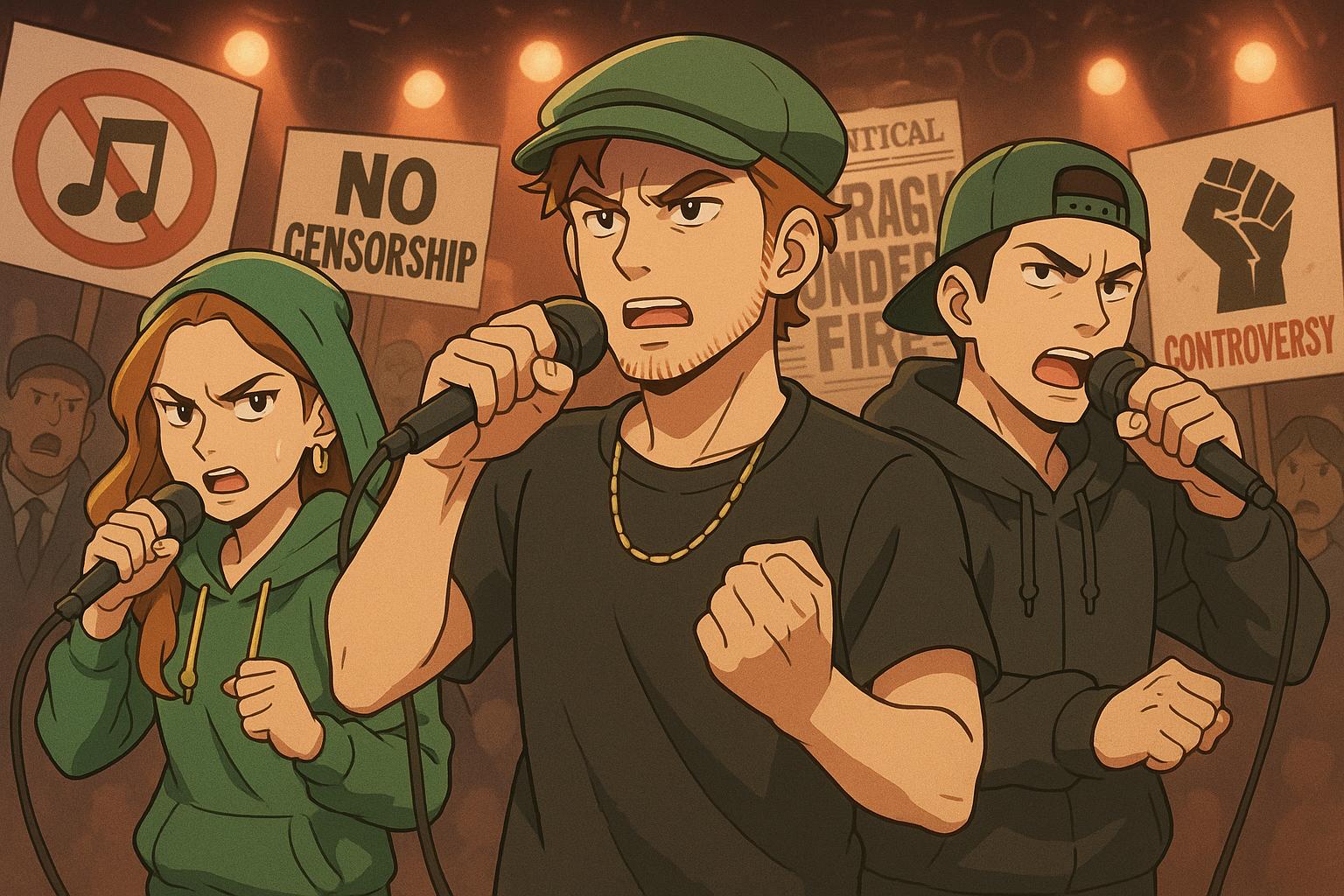A controversial Irish rap group, Kneecap, is embroiled in a significant backlash, facing legal threats and public condemnation over inflammatory comments allegedly made during performances. The trio, known for their provocative style and songs infused with Irish republican themes, has issued a statement threatening to sue music industry figures who called for their removal from the Glastonbury Festival lineup. This marks a contentious chapter in a narrative that intertwines artistic expression with serious political ramifications.
Kneecap's recent rise to notoriety can be traced to their performances at prominent events, including Coachella, where they displayed slogans such as "F*** Israel, Free Palestine," sparking outrage across the political spectrum. Critics have linked these actions to a broader pattern of controversial remarks, including statements that seemingly endorse violence against politicians, particularly targeting Conservative MPs with phrases like "kill your local MP." The Metropolitan Police have responded by launching a counter-terrorism investigation following the emergence of video footage capturing these incitements.
The band, comprising Naoise O Caireallain, Liam Og O hAnnaidh, and JJ O Dochartaigh, maintains that their comments have been taken out of context and are a part of a deliberate smear campaign. In a public apology to the families of murdered MPs Jo Cox and David Amess, Kneecap asserted that while they staunchly defend freedom of expression, they do not condone violence in any form towards individuals, including elected officials. “We do not, and have never, supported Hamas or Hezbollah,” the group clarified, further rejecting claims that their performance messages incited violence.
This controversy has resonated deeply within the music industry. Several key figures have advocated for Kneecap's removal from festival lineups, asserting that their views conflict with values of peace and tolerance, especially during a time of heightened awareness regarding antisemitism and political violence. Conservative MP Kemi Badenoch and former TV judge Sharon Osbourne are among the critics, with Osbourne describing the band as lacking in talent and using the controversy as a marketing ploy. Letters have circulated, including from TUV leader Jim Allister, urging festival organisers to reconsider Kneecap's inclusion in lineups alongside renowned acts like Neil Young and Charli XCX.
Conversely, some industry supporters argue that attempts to silence Kneecap represent a dangerous precedent that threatens artistic freedom. Their supporters contend that the band’s confrontational style mirrors the punk attitude of musicians from a bygone era—a genre built on challenging norms and sparking debate through unabashed expression. However, this artistic liberty raises questions about the responsibilities that come with public platforms, especially when the messages may appear to trivialise the complexities surrounding real-world conflicts such as those in Israel and Palestine.
Despite calls for their removal from several festivals, including recent cancellations at the Eden Project, others like Wide Awake in Brockwell Park have maintained their support for Kneecap, standing by the group's right to perform. Glastonbury Festival has yet to comment officially on the situation, leaving the potential for both public outcry and legal repercussions looming as they approach the summer festival.
The stakes are high as this unfolding drama reveals the intersection of music, politics, and societal values. In a landscape that increasingly scrutinises artistic expression for its impact, Kneecap's situation is emblematic of broader cultural debates on free speech and accountability in an era where the lines between performance art and real-world implications are often blurred.
Reference Map
- Paragraph 1: [1], [3]
- Paragraph 2: [2], [3]
- Paragraph 3: [4], [5]
- Paragraph 4: [6], [4]
- Paragraph 5: [2], [3]
- Paragraph 6: [5], [3]
- Paragraph 7: [1], [3]
Source: Noah Wire Services
